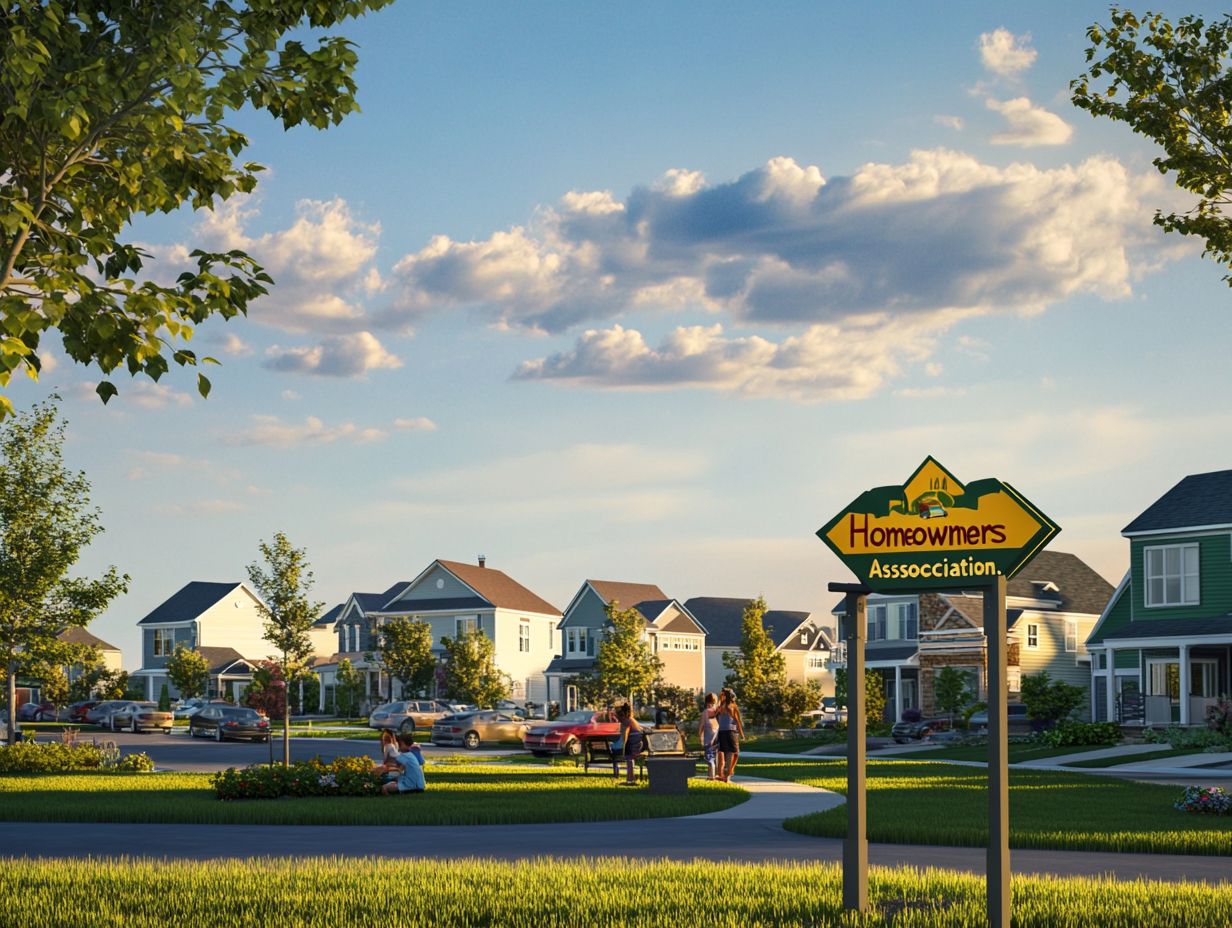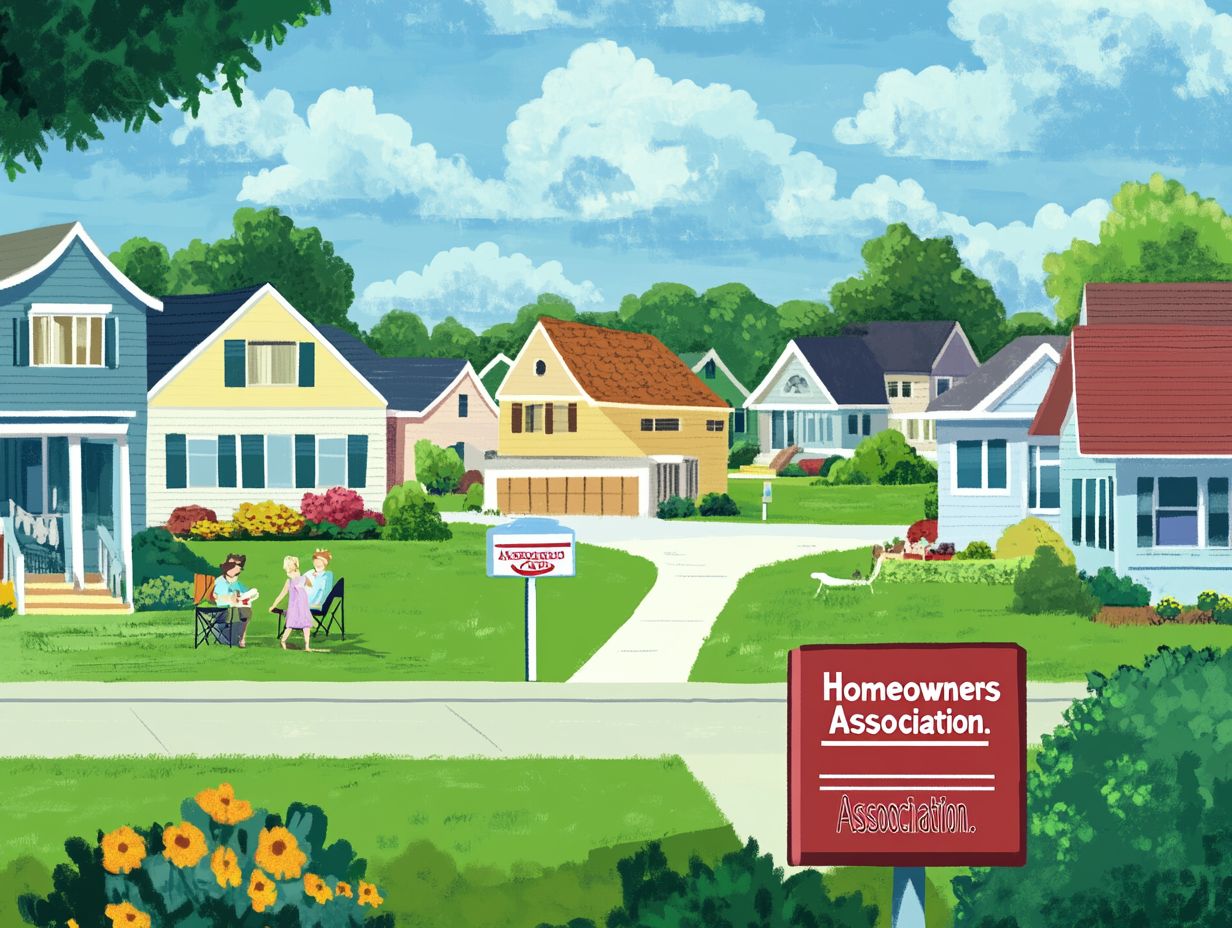What Is an HOA?
Homeowners Associations (HOAs) play a crucial role in many residential communities. However, their structure and purpose can often be misunderstood.
This article clarifies what an HOA is. It explains the benefits it offers, like access to shared amenities and maintaining property values.
It also covers the responsibilities of HOA membership, clears up common misconceptions, and guides you in selecting the right community for your lifestyle.
Whether you’re thinking about moving into an HOA or just want to learn more, this overview gives you the essential information you need.
Contents
Key Takeaways:

HOAs, or Homeowners Associations, manage and maintain shared areas and amenities in a community. They protect property values and ensure residents follow community rules and pay dues.
Explore various HOA communities near you and find the perfect fit for your lifestyle!
Understanding HOAs
Understanding Homeowners Associations (HOAs) is crucial if you’re already a resident or considering moving in. These organizations significantly shape how communities are governed.
They set rules that help maintain a high standard of living, impacting property values and the overall look and feel of shared spaces.
A board of directors oversees these associations. They enforce compliance with the community’s rules, known as CC&Rs, or Covenants, Conditions, and Restrictions.
This oversight cultivates a harmonious living environment for everyone involved.
Benefits of Living in an HOA Community
Living in an HOA community offers many advantages that can enhance your quality of life. You gain access to shared amenities like pools, parks, and recreational facilities.
These communal resources help you feel connected to your neighbors and play a vital role in neighborhood upkeep. With well-maintained landscaping and communal facilities, your property value is protected and often enhanced.
One of the best things about living in an HOA community is the access to shared amenities. These communities often feature inviting swimming pools, lush parks, and well-equipped fitness centers.
These amenities encourage you and your neighbors to engage, fostering a sense of belonging. Spend warm summer days lounging by the pool or organizing picnics in the parks!
Maintaining Property Values

HOAs play an essential role in protecting property values. They enforce rules on how homes should look and be maintained.
Every property must meet specific standards, enhancing neighborhood appeal and fostering pride among residents. By implementing guidelines for landscaping, paint colors, and structural modifications, they create a harmonious environment.
This consistency attracts potential buyers; well-maintained neighborhoods are more desirable, leading to increased property values. HOAs encourage homeowners to invest in their properties, ensuring the community remains vibrant for years to come.
Responsibilities of HOA Members
As a member of your homeowners association, you have important responsibilities. These are essential for your community to function well.
This includes following the rules, paying your HOA fees on time, and joining community meetings.
Failing to comply can result in penalties. This highlights the crucial role of your collaboration in maintaining a harmonious environment for all residents.
Payment of Dues and Following Rules
Payment of HOA fees and following rules are fundamental responsibilities you hold as a member. These obligations ensure that your community thrives, remaining vibrant and well-maintained.
When you pay your dues on time, you’re not just supporting essential services like landscaping, maintenance, and amenities; you re also helping to prevent additional fees that may be charged if the HOA funds run low.
Enforcing community rules is vital. It helps preserve property values and promotes a sense of order within the neighborhood.
Collectively, these elements contribute to a financially healthy HOA and enhance the overall satisfaction and quality of life for everyone in the community.
Common Misconceptions about HOAs
Homeowners associations (HOAs) are key to how communities work; yet, they often find themselves shrouded in misconceptions that can cause misunderstandings among residents and potential buyers.
You might envision HOAs as overly controlling entities, enforcing a barrage of strict rules. However, the reality is quite different; they exist to nurture a sense of community and uphold standards that enhance everyone’s well-being.
By clarifying these myths, you can gain a deeper appreciation for how HOAs contribute to maintaining the quality and value of your neighborhood.
Separating Fact from Fiction

Separating fact from fiction about homeowners associations is essential for cultivating a clearer understanding of their functions and objectives.
Many people assume that HOAs exist merely to impose rigid rules, often depicting them as indifferent to individual homeowner interests. However, the reality is far more nuanced.
Homeowners associations play a crucial role in maintaining property values and enhancing the aesthetic appeal of communities. They ensure neighborhoods remain attractive and well-maintained.
By enforcing established community standards, including landscaping guidelines and architectural controls, they help create harmonious living environments that benefit everyone.
Well-managed HOAs often go beyond enforcement; they facilitate social events, foster neighborly connections, and provide essential services such as maintenance, and enrich the community experience. Understanding this can transform your perspective on what these organizations truly offer.
How to Find the Right HOA for You
Finding the perfect homeowners association (HOA) tailored to your needs is essential for cultivating a rewarding living experience. It demands careful research and evaluation.
Assess the amenities available, consider the fees associated with the HOA, and examine the overall governance. This diligence ensures that everything aligns seamlessly with your lifestyle.
Researching and Evaluating HOA Communities
Choosing the right HOA is crucial for your happiness at home. Here s how to find the best fit for you!
Researching and evaluating homeowners association (HOA) communities is crucial for finding the perfect match for your lifestyle. It requires a thorough and thoughtful approach.
Explore each community’s unique amenities, associated fees, and overall governance. Look closely at recreational facilities, whether they be pools, gyms, or parks, as these can greatly influence your daily experience.
It’s also essential to analyze the monthly or annual fees to ensure they fit within your budget. Understand what services and maintenance they encompass.
Engaging with current residents can offer invaluable insights into the responsiveness of the board and the overall vibe of the community. Familiarizing yourself with the HOA’s rules will help you avoid any unpleasant surprises after moving in, paving the way for a harmonious living environment.
Legal Powers of HOAs
Homeowners associations (HOAs) have legal powers to enforce community rules. This ensures residents comply with standards.
HOAs implement Covenants, Conditions, and Restrictions (CC&Rs). These rules set clear standards for property maintenance.
When residents do not follow these rules, HOAs can impose penalties. This can include fines or legal action.
By enforcing these standards, HOAs foster community harmony. They also play a vital role in protecting property values.
This makes the community attractive to current residents and potential buyers.
Frequently Asked Questions

What Is an HOA?
An HOA, or Homeowners Association, manages planned communities. This includes neighborhoods or condominium complexes.
What is the purpose of an HOA?
The purpose of an HOA is to enhance community value and quality of life. They enforce rules, manage common areas, and collect fees.
What are the benefits of being part of an HOA?
Benefits of an HOA include access to amenities like pools and parks. They also foster a sense of community and protect property values.
What are the fees associated with an HOA?
HOA fees vary by community and amenities. Homeowners typically pay these fees monthly or annually to fund community management and maintenance.
What are the rules and regulations of an HOA?
HOAs have rules, also known as CC&Rs, that govern the community. These can include guidelines for architecture, noise, and pets.
Can I opt out of being part of an HOA?
Homeowners usually sign an agreement to follow HOA rules and pay fees. Opting out is often not possible, but some communities may allow it under certain conditions.






